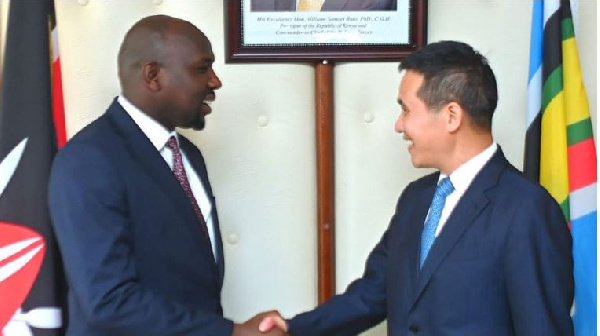
Kipchumba Murkomen (left) with China’s ambassador to Kenya Zhou Pingjian
NAIROBI, Nv 21 (NNN-GNA) — The Chinese may yet be involved in more business in Kenya’s infrastructure rebuilding, even as Western countries jostle for the ear of the new administration under President William Ruto.
This week, Roads, Transport and Public Works Cabinet Secretary Kipchumba Murkomen hosted China’s ambassador to Kenya Zhou Pingjian with whom they discussed continuation of infrastructure projects. Some observers say this indicated Beijing was still keen on using Kenya as a launch pad into the hinterlands of Africa, a long-held ambition under the Belt and Road Initiative.
“We consider China a close friend and a great partner owing to their active involvement in the transformation of Kenya’s infrastructure landscape over the past 20 years resulting in cheaper, faster and a more efficient movement of people and goods between cities and towns,” Murkomen said.
They discussed projects in the aviation sector, Murkomen said, “including expansion of airports starting with the Jomo Kenyatta International Airport (JKIA). We look forward to continued collaboration in infrastructure development and attracting more investment into the sector.”
The meeting was significant, coming just days after he released what he called contract details of the controversial Standard Gauge Railway, the Chinese built and is, to date, Kenya’s biggest infrastructure project ever built. It is also one of those projects blamed for raising debt.
Nairobi insisted it was not abandoning China yet. In fact, Murkomen had signalled last month, he would consider re-negotiating the airport projects, some of which had been cancelled by the former administration.
“If approved, my priority will be to relook at the Greenfield terminal tender which was cancelled in 2016 after the contractor had been paid Ksh4.2 billion ($34 million),” Murkomen told legislators at a vetting session last month.
“I will use my legal background and other available resources to take this case out of court, renegotiate the contract and possibly rebuild the Greenfield terminal.”
In 2014, Anhui Civil Engineering Group and China Aero Technology Engineering International Corporation were awarded a Ksh56 billion ($460 million) contract to build a terminal expected to handle 20 million passengers a year. It was cancelled in 2016.
But the Chinese firm slapped Kenya Airports Authority with a Ksh17.6 billion ($14 million) bill for breach of contract in a case now under arbitration.
At the JKIA, China Jiangxi International Economic and Technical Cooperation last month finished refurbishing terminal 1B and C with newer screening facilities. Other projects include the Nairobi Expressway, Kipevu Oil Terminal, Likoni Floating Bridge and a series of roads.
“The closed loop system of project implementation means that Kenya doesn’t have to go through different partners for design, financing and construction of infrastructure projects,” Dr Cavince Adhere, a Kenyan academic and analyst on Sino-Africa relations told The EastAfrican, explaining the advantage of Chinese funding, over debt complaints.
“China doesn’t send money to partner governments. It ring-fences the resources to ensure they are only spent in project implementation. Because of this, you barely hear money or resources from China meant for construction of roads, ports or dams stolen,” he stated.
The Chinese, however, say their investments in Africa will change to focus more on technology, even though he downplayed fears Kenya was looking away from Beijing.
“We have [a] new resolution in sharing technological advances with our African friends. “How we implement projects depends on the specific approvals [by the host country],” Zhou said at a briefing on plans of the Chinese Communist Party in the next five years.
According to him, the SGR will not just be a figure of infrastructure, but a point of learning by others such as Uganda where the line is expected to reach in future on railway technology and logistics, while having operations of the railway fully run by locals after training.
Beijing, he argued, was advising all its enterprises on the continent to adopt digital diffusion through partnership with local universities while also engaging in corporate social responsibility.
China, nonetheless, is fighting back criticism of debt trap, arguing multilateral lenders, in fact, have tougher conditions and have loaned more to African countries than Beijing according to a press bulletin last week by the China Ministry of Foreign Affairs.
China has been part of Kenyan airports upgrade from the time of President Mwai Kibaki. China Overseas Engineering Company in 2008 during the Grand Coalition government. — NNN-GNA






